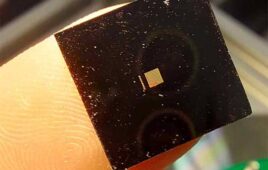
A tough adhesive applied onto a pig heart to show superior adhesion and stretchability performance. [Image from Jianya Li, Adam D. Celiz, David J. Mooney]
Some of the current adhesives on the market can be toxic and stick together tissues weakly. Some can’t be used in wet environments altogether, which can pose a problem for closing tissues in the body. Harvard University engineering researcher Jianya Li and his team used the defensive mucus secreted by slugs to develop a surgical glue that addresses the challenges associated with previous adhesives.
Li and his team created a family of tough adhesives that replicate the tough but flexible matrix of the mucus. The mucus also contains positively charged polymers that stick to substances through a variety of physical mechanisms like covalent bonds.
The researchers tested the new adhesive by sealing a defect in a pig heart that was slick with blood. The adhesive conformed well to the heart and did not cause any leakages when the heart inflated.
The tough adhesive was also able to stick to pig skin, cartilage, heart, artery and liver tissues strongly. It was also found to be non-toxic to human cells.
Emergency situations where tough adhesives would need to be used like emergency surgery or sudden blood loss were tested in rats. The researchers found that the tough adhesive was comparable to a hemostat.
The research was published in the journal Science.




